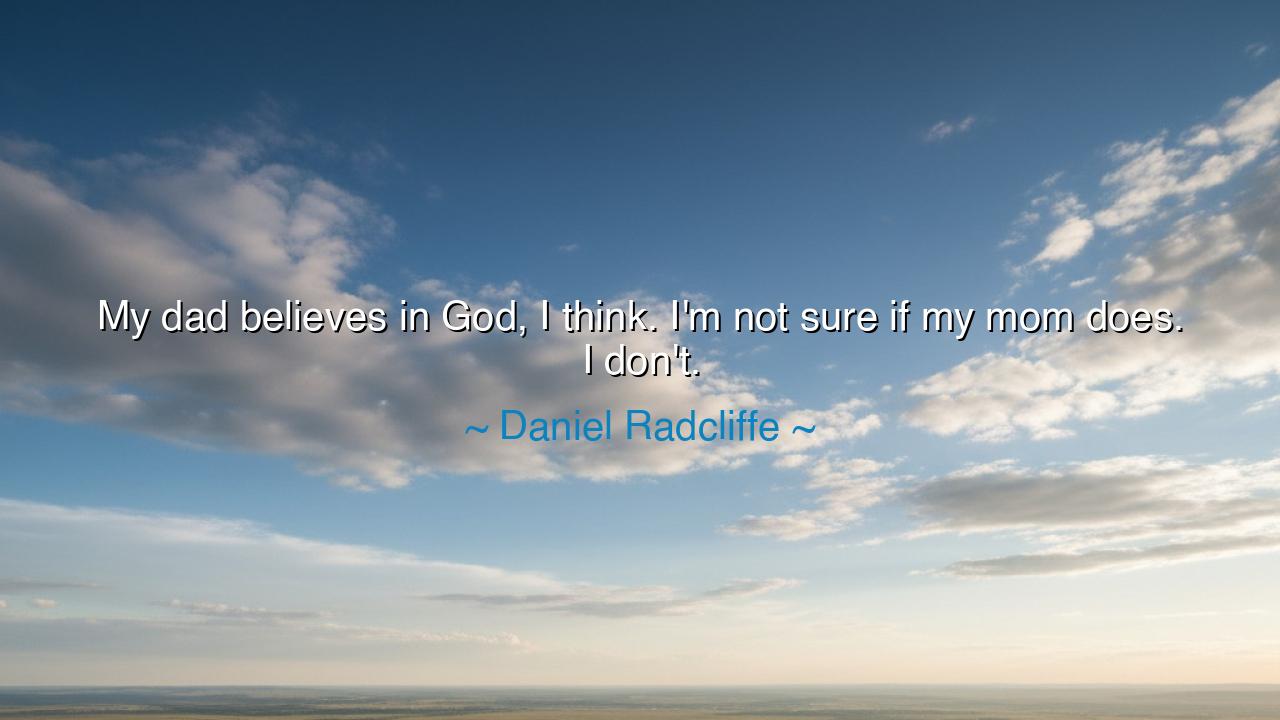
My dad believes in God, I think. I'm not sure if my mom does. I






“My dad believes in God, I think. I’m not sure if my mom does. I don’t.” — these words, spoken by Daniel Radcliffe, are quiet, simple, and human. Yet within their humility lies a deep reflection on faith, individuality, and the eternal search for meaning that defines the human condition. Radcliffe, once the face of a magical world beloved by millions, here removes all illusion and speaks as a man, not an icon. In this confession, we find not rebellion, but honesty — the courage to stand in the space between belief and doubt, and to call that space home.
From the earliest days of civilization, men and women have wrestled with the question of the divine. Some see God in the order of the stars, others in the chaos of the sea; some hear His whisper in the wind, others in the silence of reason. Yet there have always been those — like Radcliffe — who cannot, in truth, affirm what they do not feel. His words are not the cry of an unbeliever, but the quiet acceptance of one who refuses to pretend. In this, he follows the wisdom of the ancients: that the first step to truth is to speak sincerely, even when one’s answer is uncertainty.
“My dad believes in God. I think.” Here, we see a son’s reverence for his father’s faith — not mockery, but distance. Faith, after all, is not inherited like blood; it must be chosen. Each soul must encounter the divine — or its absence — in its own way, and at its own hour. The father’s belief is a star that shines for him; the son, walking another path, must seek his own constellation. Thus, even within one family, the cosmos of conviction may differ. And yet, the love between them — father, mother, son — remains, proving that respect transcends belief.
History has seen countless hearts divided in the same way. Galileo Galilei, devout yet questioning, looked to the heavens and found both wonder and exile. His faith in reason did not destroy his reverence for creation — it deepened it. Likewise, Albert Einstein, though not religious in the orthodox sense, spoke of a “cosmic religion” — a reverence for the beauty and mystery of existence itself. These were men who, like Radcliffe, recognized that disbelief does not mean emptiness. It can mean standing in awe before a universe vast enough to include both faith and doubt, both mystery and reason.
Radcliffe’s statement also speaks to the modern age — an age where tradition and skepticism coexist uneasily. In a world of science and spirit, many live as he does: uncertain, yet sincere. To say “I don’t” believe in God is not to reject goodness or morality, but to affirm that one’s compass must come from within. The ancients would call this autarkeia, or inner sufficiency — the idea that virtue is not imposed from above, but cultivated through wisdom, empathy, and self-awareness. One who lives truthfully, kindly, and humbly, honors the divine even without naming it.
And yet, there is something profoundly human in the contrast of belief within a family. It reminds us that love is stronger than creed. A household may hold many faiths or none, yet if there is patience and listening, it becomes a temple of understanding. The father’s faith, the mother’s uncertainty, the son’s disbelief — each reflects a different facet of the same eternal question. The wise see not contradiction, but completeness. For even in disagreement, love remains the bridge across which meaning travels.
The lesson of Daniel Radcliffe’s words, then, is not about God alone, but about honesty, humility, and tolerance. Believe if your heart commands it; question if your mind demands it. But do both with kindness. Never despise the believer, nor condemn the skeptic. For the divine, if it exists, dwells equally in conviction and inquiry. It is found wherever truth is sought sincerely — in the prayer of the faithful, and in the silence of the thoughtful.
So remember this, O seeker of wisdom: faith and doubt are not enemies, but companions. One asks; the other answers. And even if you, like Radcliffe, cannot yet find belief, walk gently through the world — for every creature, every life, every moment of love, may be the proof you did not expect to see.






AAdministratorAdministrator
Welcome, honored guests. Please leave a comment, we will respond soon